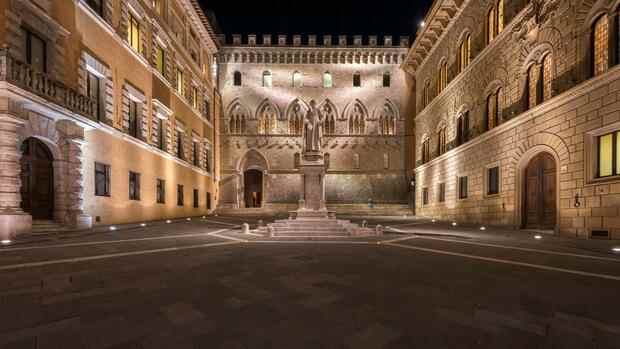Rome The negotiations between the Treasury and Unicredit lasted almost three months. They burst on Sunday evening. The Milanese bank will not be used as a basin for the crisis institute Monte dei Paschi di Siena (MPS).
Italy is now running out of time. In 2017, the state jumped into the world’s oldest bank, saving it from collapse with 5.4 billion euros in tax money. Since then, the Ministry of Finance has held 64 percent of the shares. According to EU regulations, the bank should return to the private sector by the end of the year. The step hardly seems realistic anymore. What are the possible scenarios?
Italy actually wanted to avoid another injection of funds for MPS at all costs. But it now seems like the most likely scenario. The European Central Bank had already estimated the acute financial needs of the institute from Tuscany at around three billion euros in the summer. As reported from the negotiating circles, Unicredit is said to have demanded an even higher sum.
Reuters quotes a “person familiar with the matter” that a state capital increase of 6.3 billion euros was a condition in the room to take over large parts of the bank.
Top jobs of the day
Find the best jobs now and
be notified by email.
Specifically, Unicredit wanted to take over 60 billion euros in assets, almost three quarters. The Milanese were also interested in around 1,000 of the 1,300 branches. 5000 to 6000 jobs should be eliminated with the deal – most of them through retirement schemes.
For fresh government billions, MPS needs a permit from Brussels. Italy could then ask the EU Commission to extend the sales period, at least half a year. That would give the state enough time to start new negotiations – with Unicredit, but also with other players in the Italian banking market, such as the medium-sized Banco BPM.
Scenario 2: MPS remains independent
MPS definitely needs fresh money. The government should therefore work on a plan B. Several Italian media reports that the same framework that was offered to Unicredit could be applied to a “standalone” project. This means that MPS should remain independent after a capital increase and the state should slowly withdraw.
As with the failed Unicredit deal, the management would then be rebuilt and bad loans transferred to the state rescue company Amco. MPS is dragging around non-performing loans worth more than four billion euros, a share of 4.5 percent. In addition, there are around 14 billion euros in loans that are particularly at risk.
Apart from that, the record is not all bad. When MPS presented its half-year figures in August, the bottom line was a net profit of 202 million euros. In the pandemic year 2020 there was still a loss of 1.68 billion euros. On the other hand, the continued low equity ratio (10.6 percent) is a cause for concern.
The current upswing could help the bank. Italy’s economic output is expected to grow by six percent this year. In addition, interest rates in the euro zone could soon rise, and banks would then make money again more easily than in the current zero or negative interest rate environment.
Scenario 3: MPS becomes French or Spanish
So far, a solution outside of Italy has been rather unrealistic. Because the deal with the dream buyer number one has broken, the scenario could now come out of the drawer again. There have been no official statements so far, but there has been speculation in the past that the French banks Credit Agricole or BNP Paribas might be interested in MPS. The Spanish BBVA could also bid, as it has just launched its home banking platform in Italy.
Dilemma for Mario Draghi: the political consequences
Enrico Letta, head of the co-ruling Social Democrats, born in the MPS home town of Tuscany, praised the decision of the finance ministry in a TV interview: “The impression appeared that Unicredit believed it was taking part in a sell-off.” From banking circles, however, it is said that Unicredit CEO Andrea Orcel is said to have left the negotiating table first.
Whichever story is true – for Prime Minister Mario Draghi’s government, the broken deal is a setback. Unicredit was the preferred partner, it was hoped that the expensive MPS dossier could finally be closed. Draghi is currently negotiating his first budget law, he wants to lower taxes, reorganize the pension system, improve families. It all costs money. At the same time, providing billions for a bank that has been in crisis for years would come at an inopportune time for the government.
More: How Unicredit is fighting for the Monte dei Paschi crisis bank.
